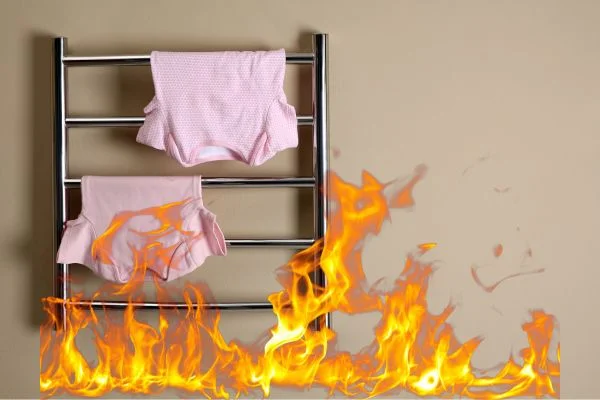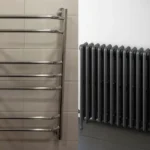An heated towel rail is a luxurious addition to any bathroom, giving you warm towels and a cozy atmosphere. Any electrical appliance can cause safety concerns, though. This article explores the question: Can heated towel rails catch fire?
The purpose of this article is to provide you with a comprehensive understanding of these popular bathroom fixtures’ safety features, risks, and best practices.
Heated towel rails typically don’t catch fire when used properly. They are designed with safety features to prevent overheating, but regular maintenance is essential to ensure their safe operation.
Are Electric Towel Rails Safe?
When used and maintained properly, electric towel rails are generally safe. To ensure their safe operation, you need to understand and follow safety guidelines. First, we will address common concerns and provide information about electric towel rails.
Electrical Safety
There’s a lot of electricity involved with electric towel rails, so safety has to be a priority. Here are a few things to keep in mind:
- A professional electrician should install the towel rail to make sure the wiring is right and the power is connected. By doing this, you’re preventing potential hazards.
- Check that the electric towel rail complies with local electrical regulations and safety standards. It makes sure the product has been tested and meets safety standards.
- Make sure the towel rail is protected by a Ground Fault Circuit Interrupter (GFCI). When an electrical fault is detected, a GFCI cuts off the power right away, reducing the risk of an electric shock.
- Make sure the towel rail’s electrical components are well-insulated and protected from moisture. It prevents short circuits and electrical accidents.
User Safety
When using electric towel rails, there are other things to keep in mind besides electrical safety:
- Choose a towel rail that you can control the temperature. You can set the level of warmth you want without burning yourself.
- Timer and automatic shut-off: Some electric towel rails have timers or automatic shut-offs. These are valuable safety mechanisms that prevent the rail from running indefinitely, reducing the risk of overheating.
- Make sure your towel rail is made from high-quality materials and sturdy. Structural issues or accidents are minimized because of this.
- To prevent accidental burns or tampering, choose models with childproof features such as temperature locks or guards.
Maintenance and Care
Electric towel rails are safer if they’re properly maintained and cared for:
- Check the towel rail periodically for wear, damage, or loose connections. Consult a professional if you notice anything.
- Wipe the towel rail regularly with a soft, dry cloth. Don’t use abrasive cleaners that might damage the surface.
- Ventilation: Make sure the towel rail’s air vents aren’t blocked. Overheating and fire hazards are caused by blocked vents.
- Hanging or draping anything other than towels on the rail can block airflow and cause overheating.
Also Read: Do Anthracite Towel Rails Rust?
Can Heated Towel Rails Catch Fire | Let’s Find Out

Understanding Heated Towel Rails
Towel warmers, also called heated towel rails, are electrical appliances that keep towels warm and dry. Most of them have a metal frame with heated bars or coils. The bars warm up through electrical resistance, transferring heat to the towels and creating a comfortable and cozy bathroom.
Potential Fire Hazards
Although heated towel rails are generally safe, you should be aware of potential fire hazards. The biggest risk is a malfunction in the electrical components, which can happen because of poor installation, faulty wiring, or excessive use or blocked air vents. An overloaded electrical circuit can also cause a fire.
Make sure you get a qualified electrician to install it, and follow the manufacturer’s safety guidelines. Inspecting and maintaining your car regularly is also key to catching problems early. Moreover, don’t drape towels or other flammable materials over the heated bars, as this can cause a fire.
Safety Features
Many heated towel rails come with safety features to prevent fires. Modern designs usually have automatic shut-off mechanisms. After a certain time or when the desired temperature is reached, these mechanisms shut off the appliance. It prevents overheating and saves energy.
Heated towel rails also have thermal fuses. As a failsafe, they cut off the power if the temperature gets too high. It keeps the rails from getting too hot and reduces fire risk.
Also Read: How High Should A Towel Rail Be From The Floor?
Best Practices for Safe Usage
Follow these best practices to use heated towel rails safely:
- Proper installation: Get a professional electrician to install the towel rail according to the manufacturer’s instructions.
- Regular Maintenance: Regularly check the towel rail for wear and damager any signs of wear or damage. Clean the rails regularly to prevent dust accumulation.
- Avoid Overloading: Don’t put too many towels on the towel rail. Be sure to follow the manufacturer’s guidelines about maximum weight and number of towels.
- Avoid Flammable Material: Keep flammable stuff away from heated bars, like clothes, plastic, and paper. It reduces the risk of accidental ignition.
- Unattended operation: Never leave the heated towel rail unattended for long periods. Always turn it off when leaving the bathroom or the house.
Also Read: How To Fix Towel Rail | Pro Guide
Bottom Line
So, Can Heated Towel Rails Catch Fire? Despite the fact that heated towel rails can catch fire, the risks can be significantly minimized by following safety guidelines, installing them correctly, maintaining them regularly, and following best practices.
Choose a towel rail with safety features like automatic shut-off mechanisms and thermal fuses. If you’re aware of potential hazards and take safety precautions, you can enjoy a heated towel rail without compromising your safety.



